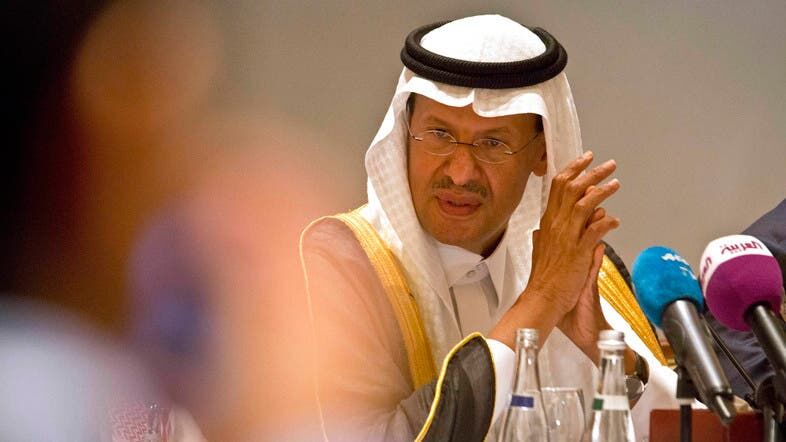Yesterday, Mr. Zangeneh referred to you as his friend of 22 years, and said, "We want to be friends in the region and they (i.e. Saudi authorities) should not regard us as their enemy." Prince Abdulaziz! Yesterday, I personally asked the Iranian Petroleum Minister about the possibility of positive changes in Iranian-Saudi relations. Mr. Zangeneh replied, "I hope there will be positive changes." Please, take these words seriously and aside from all the differences, help bring the two countries closer together. You have this power as the son of the King of Saudi Arabia and a member of the Saudi Government Cabinet.
1- Abdulaziz bin Salman has been with Saudi energy ministers for over two decades and has played an important role in making important decisions for Saudi Arabia and Organization of the Petroleum Exporting Countries (OPEC). He is one of the key players in formulating OPEC's long-term strategy. In 2016, the night that Algeria's historic deal to cut OPEC oil production (which later resulted in the OPEC and non-OPEC agreement in Algeria) was finalized, I saw it with my own eyes that the cooperation of the Iranian-Saudi oil delegations led to clinching of the deal. As a matter of fact, before that, when Mr. Zangeneh and Kazempour refused to attend the Doha summit, the agreement was not reached. Prince Abdulaziz was not yet a minister in those days, but he has been a very influential figure in Saudi oil policy making for more than two decades. Now, for the first time in Saudi history, a prince has become minister of energy, more powerful than his predecessors, namely, Hisham Nazer, Ali al-Naimi and Khaled al-Falih.
2. Prince Abdulaziz is a long-time oil market expert. He knows what could be inferred from the recent attacks on Aramco oil facilities. It is possible that the history of Aramco and the Saudi oil industry could be split into two parts before and after the drone strikes, since Saudi Arabia had always displayed Aramco as a safe and reliable haven both for Riyadh and the world before the attacks happened. The sense of insecurity in the big oil giant and the world's most profitable company can impact many aspects of Saudi Arabia from Aramco’s initial public offering (IPO) to the possibility of Aramco customers considering diversification of their oil purchase resources in the future.
3- Zaki Yamani, who was Saudi Arabia's oil minister for about 24 years, is said to have cited ending US-dependence on Saudi oil as one of the reasons for the US-led invasion of Iraq. Analyses of the Aramco drone attacks are certainly deeper than just saying, for example, that 5% of world oil production had been stalled for about a month or how much they impacted the Saudi or even the global economy. At this critical period, if decisions are not made correctly, all OPEC member states will suffer. Let’s review the latest figures released by the US Energy Information Administration (EIA): the United States imported only 1.2 million barrels a day from OPEC countries last month; the lowest amounts since 1985. That is, the lowest volume in the past 35 years. As US oil production increases, it appears that US oil imports from OPEC, including Saudi Arabia, will continue to decline. America is run by capitalism. It invests where it either can gain more profits or depends on it more, whether economically, politically, or militarily. When US’s reliance on OPEC oil, and more importantly Saudi Arabia, diminishes (which is lowering day by day), one can assume how Washington would decide to deal with these countries in the near future! That is why it can be concluded that OPEC member states, including Saudi Arabia, must mind their oil, economic, political and even military security, and this cannot be achieved without mutual understanding and interaction.
4- The escalation of tensions between Iran and Saudi Arabia, regardless of their differences, will not benefit the two neighboring countries, so it is worthwhile for the neighbors to maximize their tolerance for the differences. Iran and Saudi Arabia have been working together well in OPEC for many years, and this could be used as a model for a process to reduce tensions. Disregarding the political messages exchanged between Iran and Saudi Arabia through third countries, Iran and Saudi Arabia, through years of cooperation within the Organization of the Petroleum Exporting Countries (OPEC), have good channels for communication and reduction of tensions; provided that the authorities of the two countries wish to. I will write more about this in a separate article.
5- Prince Abdulaziz! The development and security of the oil industry is essential for the prosperity of the global economy. Both the Saudi oil industry must remain safe and Iran must be able to develop its oil industry without sanctions and keep its oil market share. I wish you would help stop the Yemeni war that has claimed the lives of many innocent people, so that Aramco oil facilities remain safe. I wish you could also help lift sanctions on Iran's oil industry so that the country that was once the second-largest producer of OPEC, not be removed from the market. This balance would serve everyone. Since 2007, I have kept a small sample of the Shaybah Field’s crude oil in my house. It was presented to reporters as a symbol of OPEC summit. I respect the Saudi oil industry. Iran and Saudi Arabia are neighbors and have no choice but to establish peaceful relations with each other. Whether today or tomorrow. This benefits everyone.
Reza Zandi
Source: Etemad Daily


Your Comment